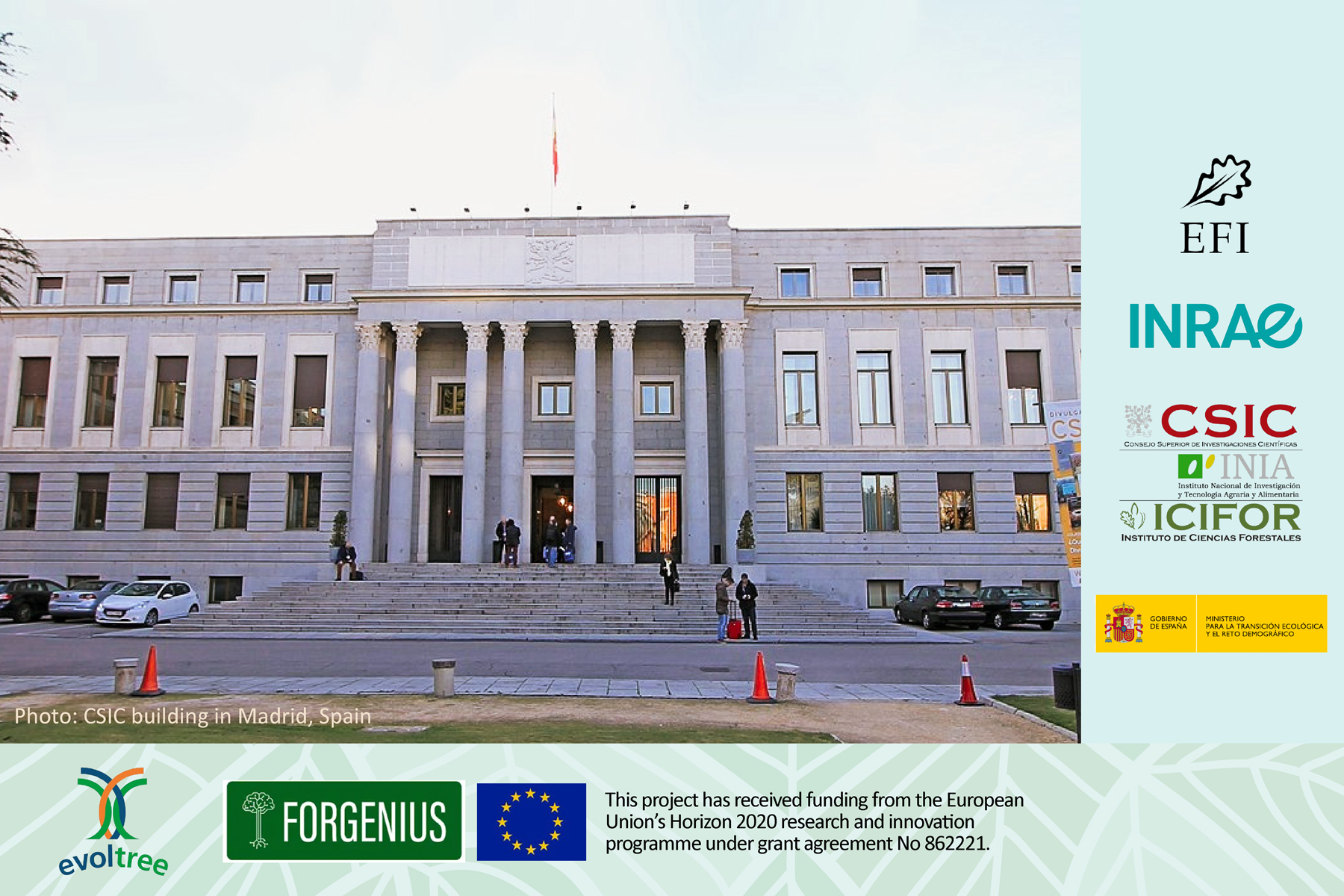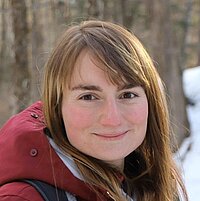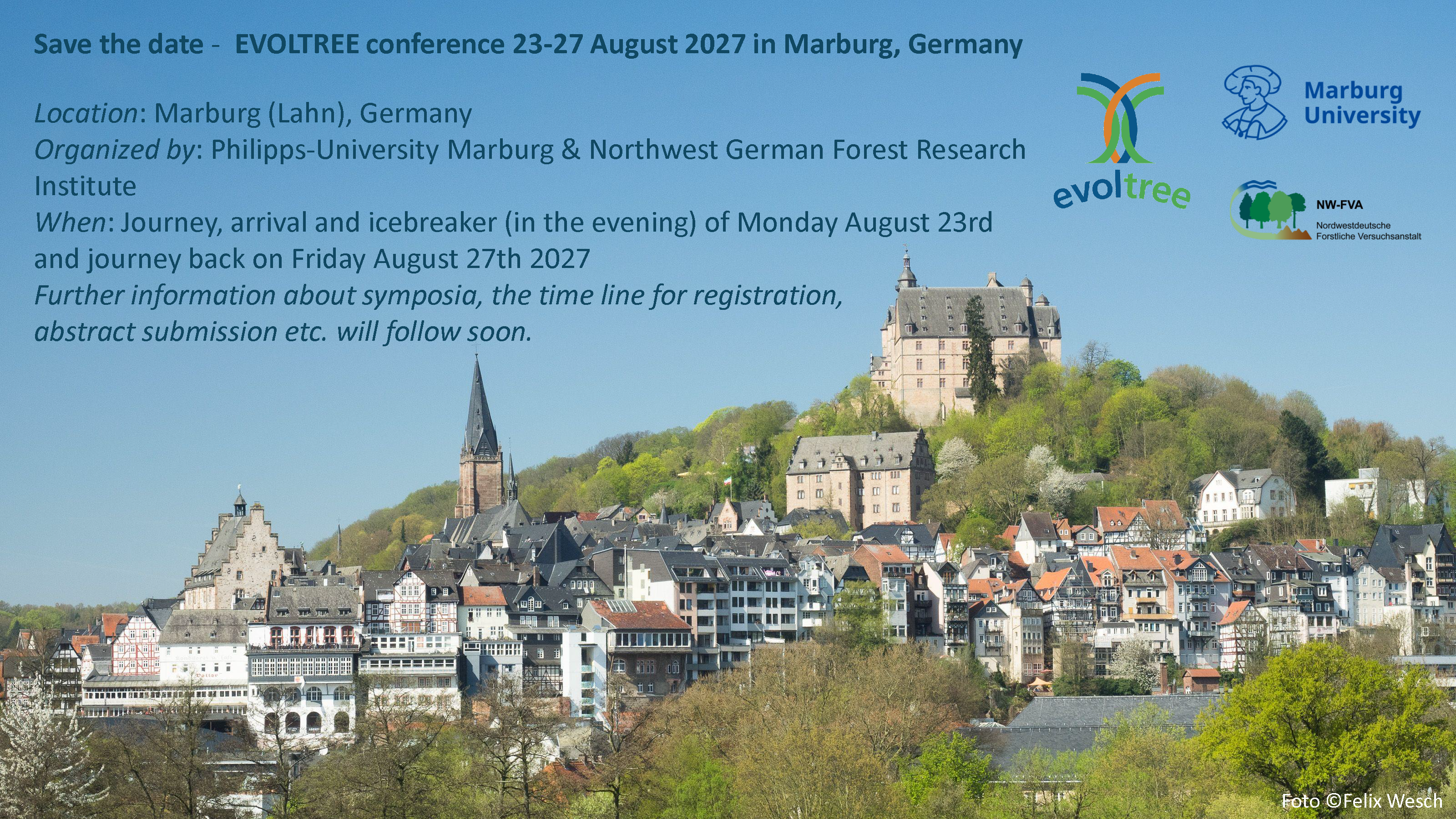Joint EVOLTREE-FORGENIUS Conference / Third Biannual EVOLTREE Conference
Integrative Diversity of Forest Ecosystems


After the success of the previous EVOLTREE conferences in Switzerland and Romania, we join forces with the EU H2020 FORGENIUS project, which aims to improve access to forest genetic resources information and services for end-users. The Joint EVOLTREE-FORGENIUS Conference/Third Biannual EVOLTREE Conference was held 18-21 November 2025 in Madrid, Spain.
The conference's theme, “Integrative Diversity of Forest Ecosystems”, highlights the importance of cross-disciplinary approaches to understanding and strengthening the resilience of forests in the face of climate, biotic, and abiotic pressures.
EU H2020 FORGENIUS: This project has received funding from the European Union’s Horizon 2020 research and innovation programme under grant agreement N° 862221

Sessions & Keynote

Session 1 - New tools for science to reach practise
Keynote speaker (photo) : David O’Brien, NatureScot, Inverness, UK & Royal Botanic Garden Edinburgh, United Kingdom
Title of presentation: "Bridging the gaps between science, policy and practice"
Chair: Mari Rusanen, Natural Resources Institute Finland (Luke), Helsinki, Finland
Scientific information is the foundation for wise decision-making, and it is the responsibility of scientists to make their research results and conclusions widely available for different uses. However, reaching the various end-user groups outside the scientific community may be challenging. In this session we will explore tools and ways to make the scientific knowledge usable and accessible to a broad audience.
We welcome presentations on solutions addressing different levels of decision making, be it policy-related or hands-on work in forests.

Session 2 - Forest Adaptation: Improving Resilience to Biotic and Abiotic Pressures
Keynote speaker (photo) : Silvia Matesanz, ReyJuan Carlos University (URJC), Madrid, (Spain)
Title of presentation: "Phenotypic plasticity and adaptive evolution in Mediterranean gypsum endemics: insights into climate change response"
Chair: Marcela van Loo, Austrian Research Centre for Forests, Vienna, Austria
Forests worldwide face diverse challenges from climate change, pests, diseases, and other environmental stressors. Understanding the adaptive capacity of forest trees and their associated biota is crucial for enhancing ecosystem resilience. This session invites contributions that explore and uncover adaptations to biotic and abiotic stressors in forest ecosystems. We welcome a broad spectrum of research that advances theory, methodology, cutting-edge approaches, or practical applications in forest adaptation, as well as studies with implications for biodiversity conservation, forest management, and policy. Submissions from diverse disciplines and systems are encouraged to foster cross-disciplinary dialogue and innovative strategies for strengthening forest resilience.

Session 3 - Navigating Multiple Global Change Pressures: The Role of Phenotypic Variability
Keynote speaker (photo) : Marylou Mantova (France), Université Clermont Auvergne, INRAE, PIAF, Clermont‐Ferrand, France
Title of presentation: "In the era of change: when genetics, physiology and modelling collide for more resilient forests"
The phenotype controls how a tree responds to, while at the same time affects, its abiotic and biotic environment. Phenotypic diversity in forest populations can create complex feedback loops affecting both community and ecosystem scale processes. Faced with the more frequent and intense extreme events typical of our changing climate, tree phenotypes are currently challenged in novel ways that can lead to decline and even extended population dieback. Despite the centrality of these studies, phenotyping traits important for survival under extreme events remains difficult. While progress has been made in developing approaches for saplings under controlled conditions, new approaches are required to determine functional traits at the appropriate spatial and temporal scales for mature trees in the field. This session will present examples of methodological and conceptual advances in this field and how they can inform forest conservation and management.

Session 4 - Breeding for Resilience: Integrating Novel Phenotyping & Genomics for Urgent Adaptive Solutions
Keynote speaker (photo) : Fikret Isik, North Carolina State University, United States of America
Title of presentation: "Tree Breeding in the Age of Genomics for Climate Change: Challenges and Opportunities".
Chair: Jan Stejskal,Czech University of Life Sciences Prague, Czech Republic
As the impacts of climate change continue to intensify, the imperative to develop resilient and adaptable tree species has never been greater. This session will examine how advanced phenotyping technologies and genomic tools are being leveraged to inform and accelerate breeding strategies capable of addressing the challenges posed by a rapidly changing environment. Through the integration of high-throughput phenotyping, genomics, and environmental modeling, researchers and practitioners are identifying novel pathways to enhance key adaptive traits, including drought tolerance, disease resistance, and overall ecosystem resilience. The keynote presentation will underscore both the transformative potential and the complexities associated with the application of genomic technologies in tree improvement programs. Additionally, discussions will emphasize interdisciplinary approaches, practical applications, and the emerging technologies critical to the development of the next generation of resilient plant systems.

Session 5 - Prioritising forest conservation through genetic diversity
Keynote speaker (photo) : Victoria Sork, University of California, Los Angeles, United states of America
Title of presentation: "Genetic and genomic strategies for conservation of natural populations of California oaks"
Genetic diversity is a fundamental, though often overlooked, component of forest biodiversity. Recent impressive advances in the availability of genomic resources and analytical tools have vastly expanded our ability to characterize the genetic diversity of forests. Information derived from next-gen data offers a wide range of applications for in-situ and ex-situ conservation and, in particular, for evaluating the need to assist forests' migration in response to climatic and environmental pressures. This session will present the latest advances in this direction and discuss cutting-edge knowledge on the adaptive patterns of forest trees.
Program
Joint EVOLTREE/FORGENIUS Conference - Integrative Diversity of Forest Ecosystems
Time (CET) | Tuesday 18.10.2025 | Wednesday 19.10.2025 | Thursday 20.10.2025 | Friday 21.10.2025 |
09:00-13:00 | FORGENIUS ExCom General Assembly | Session 2: Forest Adaptation: Improving Resilience to Biotic and Abiotic Pressures | Session 3: Navigating Multiple Global Change Pressures: The Role of Phenotypic Variability | Session 5: Prioritising forest conservation through genetic diversity |
13:00-14:00 | Lunch break | Lunch break | Lunch break | Lunch break |
Welcome | ||||
14:00-18:00 | Session 1: New tools for science to reach practise | Field trip | Session 4: Breeding for Resilience: Integrating Novel Phenotyping & Genomics for Urgent Adaptive Solutions | EVOLTREE Governing board |
18:00-19:00 | Poster session S1+S2 |
| Poster session S3+S4+S5 |
|
19:00-22:00 Social dinner |
Organization
Joint EVOLTREE/FORGENIUS Conference - Integrative Diversity of Forest Ecosystems
Organizing committee
Contact us for general questions (Delphine Grivet: dgrivet@inia.csic.es) or for invoice/certificate (Diana Barba: dbarba@inia.csic.es).
- Delphine Grivet, ICIFOR, INIA-CSIC, Madrid, Spain
- Ricardo Alía, ICIFOR, INIA-CSIC, Madrid, Spain
- Diana Barba Egido, ICIFOR, INIA-CSIC, Madrid, Spain
- Marie-Claude Bouhedi, INRAE, Avignon, France
- Carola Chiusi, EFI, Barcelona, Spain
- Lidwina Koop, EFI, Barcelona, Spain
- Carmen Paramio, AZIERTA COMUNICACION S.L., Madrid, Spain
- Jessica Walker, INRAE Transfert, Nantes, France
Scientific committee
- Santiago González-Martínez, INRAE Bordeaux, France
- Delphine Grivet, ICIFOR, INIA-CSIC, Madrid, Spain
- Marcela van Loo, Austrian Research Centre for Forests, Vienna, Austria
- Nicolas Martin, INRAE Avignon, France
- Maurizio Mencuccini, CREAF, Barcelona, Spain
- Mari Rusanen, Luke, Helsinki, Finlande
- Ivan Scotti, INRAE Avignon, France
- Jan Stejskal, Czech University of Life Sciences Prague, Czech Republic
- Giovanni Giuseppe Vendramin, IBB-CNR, Florence, Italy
Evoltree Working Group "Biannual Evoltree Conference"
- Alexandru Lucian Curtu, Transilvania University of Brasov, Romania
- Felix Gugerli, WSL Birmensdorf, Switzerland (head)
- Katrin Heer, Albert-Ludwigs Universität Freiburg, Germany
- Miran Lanšćak, Croatian Forest Research Institute, Jastrebarsko, Croatia
- Sanna Olsson, ICIFOR, INIA-CSIC Madrid, Spain
- Annika Perry, UK Centre for Ecology & Hydrology, Edinburgh, UK
- Tanja Pyhäjärvi, University of Helsinki, Finland
- Christian Rellstab, WSL Birmensdorf, Switzerland
- Nataša Šibanc, Slovenian Forestry Institute, Ljubljana, Slovenia



